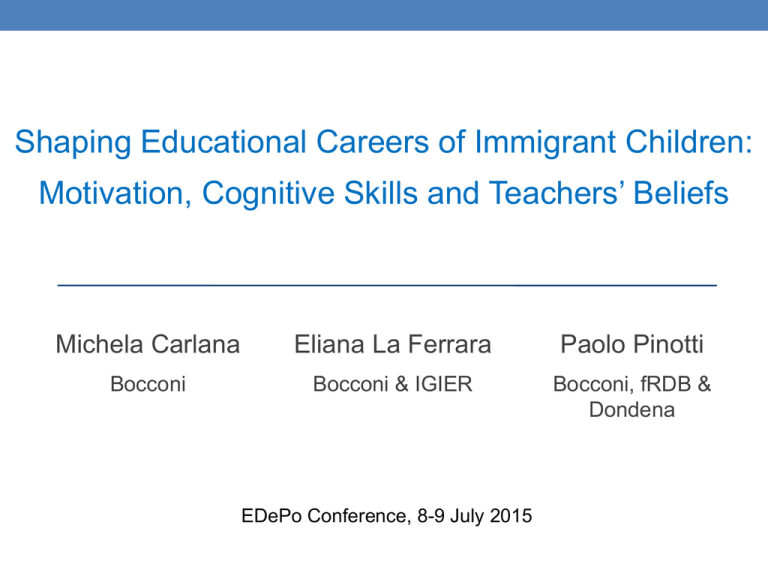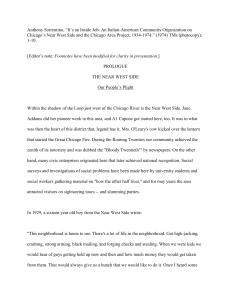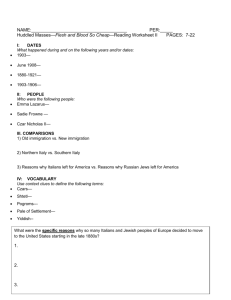Shaping Educational Careers of Immigrant Children: Michela Carlana Paolo Pinotti
advertisement

Shaping Educational Careers of Immigrant Children: Motivation, Cognitive Skills and Teachers’ Beliefs Michela Carlana Eliana La Ferrara Paolo Pinotti Bocconi Bocconi & IGIER Bocconi, fRDB & Dondena EDePo Conference, 8-9 July 2015 Motivation In most countries, children of immigrants disadvantaged in labor mkt due to lower educational attainment % of aged 20-29 w/ low attainment Males 60 Females 40 35 50 30 40 25 20 30 15 20 10 10 5 0 0 natives immigrants Source: OECD, 2011 natives immigrants Motivation (cont’d) Greater disadvantage in educational systems characterized by early tracking (Cobb-Clark et al. 2009) • High-school choice is an early career decision w/ long term consequences on labor mkt outcomes (Giustinelli, 2011) • Early tracking generally detrimental for disadvantaged groups o Information gaps (Dustmann et al. 2014) o “Aspiration trap”: low aspirations low investment (Genicot and Ray, 2014; Guyon and Huillery, 2014) o Opposite risk: frustration if over-optimistic aspirations (Goux et al., 2014) This paper 1. Document educational segregation: high-achieving immigrant students choose lower tracks than Italian students w/ comparable academic potential 2. Evaluate a large-scale program, “Equal Opportunities for Immigrant Students” (EOP), aimed at helping students make educational choices congruous to their potential 3. Analyze the mechanisms through which EOP works, including cognitive & non-cognitive dimensions Preview of results • Male children of immigrants 26% less likely to choose demanding high-school compared to natives. No difference for girls • Treatment increases enrollment in demanding tracks by 19% for treated boys (statistically, closes the gap). No effect on girls • Main mechanisms: academic motivation and teachers’ recommendation • Positive spillovers on immigrant classmates of treated students Literature Aspirations • Genicot and Ray (2014); Dalton, Ghosal, Mani (2015) • Guyon and Huillery (2014), Goux et al. (2014) Cognitive and Non-Cognitive skills • Heckman et al. (2013), Hanushek and Woessmann (2008), Almlund et al. (2011) Economics of education & Program Evaluation • Tracking: Guyon et al. (2011), Dustmann et al. (2014), Avvisati et al. (2014), Brunello and Checchi (2007) • Career Choice: Giustinelli (2011), Buser, Niederle, Oosterbeek (2013) • Peer effects: Gould et al. (2009), Carrell et al. (2013) Outline • Background on Italian schooling system & educational segregation • Intervention • Impact • Channels • Spillovers 1. The Italian schooling system & educational segregation The Italian schooling system Stratification of students after 8th grade into 3 tracks • Academic oriented (liceo) college • Technical college or white collar jobs • Vocational blue collar jobs Italian system (cont’d) Vocational track is worse under several dimensions • Employment & satisfaction w/ school choice Outcomes 1 year after graduation, by track 55 50 Percentage 45 40 35 30 25 20 Liceo unemployment rate Techincal Vocational would have chosen a different track Italian system (cont’d) 1200 1400 1600 1800 2000 • Earnings profiles by track 30 40 50 Age Vocational (3 years) Techincal College Vocational (5 years) Liceo 60 Educational segregation • Immigrant students disproportionately choose vocational track compared to Italians - Need to control for ability • Standardized test score in math & italian (Invalsi) at different points of school career • We use Invalsi 6th grade as proxy for academic potential Educational segregation (cont’d) Track choice conditional on quintile of Invalsi score Probability of enrolling in Liceo Probability of enrolling in Liceo or Technical HS or Tec 1 .8 .6 .4 .2 .2 .4 .6 .8 1 Males 1 2 3 4 Test score, 6th grade, quintiles Italians Immigrants 5 1 Educational segregation (cont’d) No segregation for girls at quintiles 3-5 Probability of enrolling in Liceo or Technical HS rolling in Liceo or Technical high-school 4 .2 .4 .6 .8 1 Females 5 1 2 3 4 Test score, 6th grade, quintiles Italians Immigrants 5 Educational segregation (cont’d) Teachers’ official recommendations systematically less oriented to academic tracks for immigrants Teachers' Recommendation (Liceo or Technical) .8 .6 .4 .2 0 0 .2 .4 .6 .8 1 Females 1 Males 1 2 3 4 Invalsi score, 6th grade, quintiles Italians Immigrants 5 1 2 3 4 Invalsi score, 6th grade, quintiles Italians Immigrants 5 Educational segregation (cont’d) No difference in motivation b/w immigrants & Italians Males Females Educational segregation (cont’d) Difference in perceived barriers Males Females 2. The intervention ‘Equality of opportunity for immigrant students’ (EOP) • Program in collaboration w/ Ministry of Education (MIUR), financed by 3 bank foundations • Target: high-performing students from low-income countries in lower secondary school • Goal: align their HS choice w/ their academic potential EOP (cont’d) Targeting of EOP Schools • All schools w/ >20 immigrant students in 5 provinces of Northern Italy 145 schools: randomize 70 treatment, 75 control Individuals • In each school, the 10 immigrant students w/ highest Invalsi test score in 6th grade (only countries w/ GDP p/c lower than Italy) Takeup rate: 79% EOP (cont’d) Components of EOP Students followed during grades 7 and 8 2 types of activities 1. Career choice consultancy • Information about Italian schooling system • type of high-schools, job opportunities, booklet translated in language of home country • Psychological support based on Social Cognitive Career Theory • 14 meetings during grades 7-8: 5 group meetings, 5 individual, 3 w/ parents, 1 w/ teachers EOP (cont’d) Examples of psychological support activities • Peer education, e.g., video on barriers and self-efficacy of high-school students • “Thinking about your past life, indicate 5 study experiences and 5 other experiences that you have completed successfully… Consider now such experiences one by one and briefly indicate where and with whom it happened, what you did and which personal resources helped you doing well in that thing -- your knowledge, skills, personality traits, motivations and everything you believe it was important to have” • “Please find below the professions you selected and indicate, for each of them, which resources are needed (knowledge, skills, personality traits, motivations, ... ) then divide them into “I have it” and “I need to develop it” • “Please list the results you would like to achieve with your job, from the most to the least important” EOP (cont’d) Components of EOP 2. Cognitive Academic Language Proficiency (CALP) • Tutor on Italian language to facilitate studying and learning all subjects • # meetings higher for students w/ lower Invalsi scores in grade 6 (2 thresholds, though little variation) • The 2 components (Career consultancy & CALP) offered as joint package, not a 2x2 design • Budget + “ethics” EOP (cont’d) Timeline 3. Impact Data 1. Ministry of Education, University and Research (MIUR): information on educational career (enrollment, failure rates, teachers’ recommendations, final grades) 2. Italian Agency for the Evaluation of Educational System (INVALSI): standardized test scores in grade 6 and 8, information on family background 3. First-hand data: questionnaire on psychological traits (academic motivation, perception of economic and social barriers on work and educational career) Characteristics of selected students 0 .01 .02 .03 .04 INVALSI in grade 6 0 20 natives 40 60 INVALSI score in 6th grade all immigrants 80 100 treated and controls 0 .01 .02 .03 .04 Balance: standardized test score in grade 6 20 40 60 80 INVALSI score in 6th grade Treated students Controls 100 Balance: other individual characteristics Variable Female Immigrant of second generation Born in ’97,’98,’99 Missing track choice Invalsi 6 grade Lower than Diploma-Mother High-School-Mother Lower than Diploma-Father High-School-Father Bluecollar-Mother Whitecollar-Mother Unemp-Mother Home-Mother Bluecollar-Father Whitecollar-Father Unemp-Father Home-Father Control N=711 0.491 0.425 0.276 0.166 60.364 0.349 0.454 0.340 0.495 0.343 0.194 0.071 0.392 0.578 0.299 0.103 0.020 Treated N=670 0.500 0.433 0.257 0.139 60.533 0.347 0.481 0.328 0.506 0.355 0.180 0.090 0.375 0.555 0.334 0.092 0.018 Diff. s.e. -0.009 -0.008 0.019 0.027 -0.168 0.002 -0.027 0.012 -0.011 -0.012 0.014 -0.019 0.018 0.023 -0.035 0.011 0.002 (0.027) (0.027) (0.024) (0.019) (0.601) (0.034) (0.035) (0.035) (0.037) (0.033) (0.027) (0.019) (0.034) (0.036) (0.033) (0.021) (0.010) Estimation framework 1. Intention to treat (ITT) Yi = track choice, failure rate, motivation, … Zi = 1 if assigned to treatment Xi = gender, Invalsi score (& sq.), generation of immigration, family background, province Std. errors clustered at school level 2. Local average treatment effect (LATE) Instrument frequency of meetings attended (>75%) w/ treatment assignment High school choice High school choice Closing the gap w/ Italians? Note: group of comparable Italian students matched on INVALSI score Heterog. effects by parents’ education Other academic outcomes failing admission to upper sec. choosing liceo or technical all males females all males females Intention to treat -0.021 (0.018) -0.052** (0.024) 0.010 (0.019) 0.065** (0.027) 0.112*** (0.036) 0.017 (0.032) IV effect -0.031 (0.028) -0.080** (0.037) 0.015 (0.029) 0.105** (0.045) 0.184*** (0.060) 0.030 (0.049) INVALSI 8th grade teachers' suggestion all males females all males females Intention to treat 1.347** (0.638) 2.689*** (0.815) 0.178 (0.793) 0.133*** (0.046) 0.146*** (0.051) 0.111* (0.058) IV effect 1.933** (0.926) 3.871*** (1.201) 0.254 (1.135) 0.193*** (0.068) 0.220*** (0.077) 0.155* (0.084) Closing the gap w/ Italians? Probability of choosing Liceo or Technical Females Males Females .1 0 .6 .7 .05 .8 .9 .15 Males Failure rates during Lower Secondary School Controls Treated Italians Controls Treated Italians INVALSI score in grade 8 Females Treated Italians Controls Treated Italians Teachers' recommendation (Liceo or Technical) Immigrant children in control grp started off w/ same test score as treated (by design), hence as comparable Italians, and then they are left behind Males Female .2 62 64 .4 66 .6 68 .8 Males Controls Controls Treated Italians Controls Treated Italians Controls Treated Italians Controls Treated Italians Additional results RDD estimates reveal no effect of CALP (tutoring on Italian language) • Small sample issue though … 4. Channels Understanding the mechanisms Heckman, Pinto, Savalyev (AER, 2013) 1. Impact of treatment on cognitive & non-cognitive skills 2. Impact of cognitive & non-cognitive skills on life outcomes 3. Decompose treatment effect into components attributable to each factor Potential channels 1. Cognitive skills: Invalsi score in Italian & Math at the end of grade 8 2. Teachers’ recommendations on HS track 3. Soft skills: questionnaire data on psychological traits exploratory factor analysis (EFA) & confirmatory factor analysis (CFA) to condense into 2 latent variables: i. Academic motivation ii. Perception of barriers Underlying psychological variables: examples • Goals • Self efficacy • Perception of barriers Impact on soft skills Impact on soft skills Variance decomposition Method by Heckman et al. (2013) 1. Effect of treatment on each channel Variance decomposition Method by Heckman et al. (2013) 1. Effect of treatment on each channel 2. Effect of each channel on the outcome of interest 3. Decomposition Decomposition of Treatment effect (males) Motivation .028*** .009 Perception of barriers .004 .012 Cognitive skills .007 .006 Teachers' suggestion .028*** .009 Total explained effect .069*** .018 0.026 .027 Total unexplained effect Why no contribution of cognitive skills & perceived barriers? Simple model where HS choice depends on • Expected income differential • Relative cost of attending academic track, which in turn depends on ability, motivation & barriers Cutoff rule for choosing academic track: Perception of barriers 0 0 .01 .5 .02 1 .03 .04 1.5 Cognitive skills 20 40 60 80 controls 100 -.5 0 .5 controls 1 Perception of barriers .04 1.5 Cognitive skills high track high track low track 0 0 .01 .5 .02 1 .03 low track 20 40 60 80 controls 100 -.5 0 .5 controls 1 • Treatment improves cognitive skills & decreases perceived barriers Perception of barriers 0 0 .01 .5 .02 1 .03 .04 1.5 Cognitive skills 20 40 60 treated 80 controls 100 -.5 0 .5 treated controls 1 • Treatment improves cognitive skills & decreases perceived barriers • But at the same time it increases motivation shift in threshold Perception of barriers 0 0 .01 .5 .02 1 .03 .04 1.5 Cognitive skills 20 40 60 treated 80 controls 100 -.5 0 .5 treated 1 controls • Compositional change can explain zero overall effect 5. Spillovers Possible spillover effects • EOP targeted top 10 immigrant students • Potential impact on classmates (immigrant or natives) due to: • Imitation, role models, peer guidance • Less opportunities for joint disruptive behavior • Teachers adjust effort upwards (e.g., b/c of improved performance of treated students) Estimation framework treatc= 1 if there is at least 1 treated student in class Xi = individual controls Zc = class controls (size, % immigrants, avg. test score of Italians & immigrants) Ws = school controls (size) Results Effect on real outcomes but not on teachers HS choice not entirely driven by teachers Conclusions • EOP reduced educational segregation • • • • cognitive skills (males) motivation (males) perceived barriers (males & females) teachers’ recommendations towards academic • Mechanisms: motivation & teachers’ support • Positive spillovers on immigrant classmates of treated students Policy implications & future work Scaling-up? Very expensive, however: • Fixed costs + costs related to evaluation increasing returns to scale from scaling up • CALP (tutor for Italian) was the most expensive part but it was not effective • Important role of ‘soft skills’ information & “aspirations” intervention would be cheaper Ongoing work • Longer term outcomes (pass grade 9, Invalsi grade 10) • Teachers’ role / bias (anonymous test vs not)






